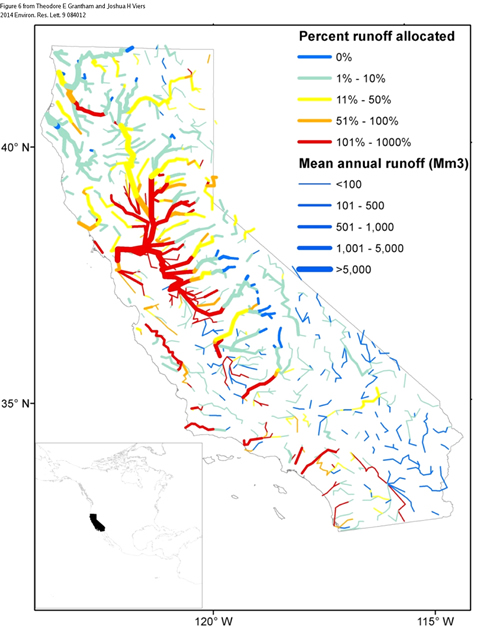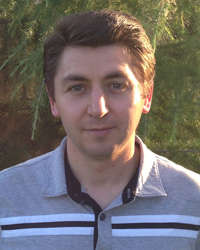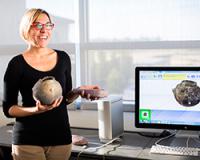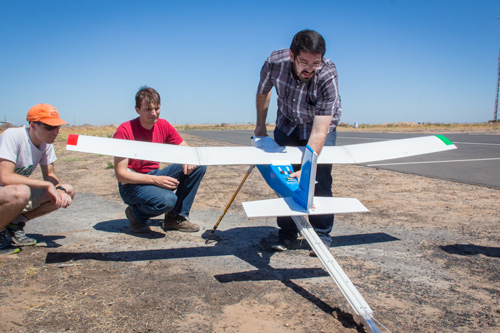HiPACC Data Science Press Room. From: UCM
The Data Science Press Room highlights computational and data science news in all fields *outside of astronomy* in the UC campuses and DOE laboratories comprising the UC-HiPACC consortium. The wording of the short summaries on this page is based on wording in the individual releases or on the summaries on the press release page of the original source. Images are also from the original sources except as stated. Press releases below appear in reverse chronological order (most recent first).
September 2, 2014 — Sierra Nevada freshwater runoff could drop 26 percent by 2100, UC study finds
.jpg)
The Sierra Nevada snowpack runoff will diminish as a warmer climate encourages more plant growth at higher temperatures, a UC Irvine and UC Merced study has determined. Credit: Matt Meadows /UC Merced
UCI/UCM 9/2/2014—By 2100, communities dependent on freshwater from mountain-fed rivers could see significantly less water, according to a new climate model recently released by researchers at UC Irvine and UC Merced. As the climate warms, higher elevations that are usually snow-dominated see milder temperatures; plants that normally go dormant during the winter snows remaining active longer, absorbing and evaporating more water, reducing projected runoff. Using water-vapor emission rates and remote-sensing data, the authors determined relationships between elevation, climate and envirotranspiration. Greater vegetation density at higher elevations in the Kings basin with the 4.1 degrees Celsius warming projected by climate models for 2100 could boost basin evapotranspiration by as much as 28 percent, with a corresponding 26 percent decrease in river flow. The study findings appear in Proceedings of the National Academy of Sciences. Scientists have recognized for a while that something like this was possible, but no one had been able to quantify whether it could be an effect big enough to concern California water managers.
UCM release
UCI Release
August 19, 2014 — California is deficit-spending its water

Cumulative water right allocations relative to mean annual runoff, excluding water rights for hydropower generation
UCM 8/19/2014—California is deficit-spending its water and has been for a century, according to state data analyzed recently by researchers from the University of California. UC Merced professor Joshua Viers and postdoctoral researcher Ted Grantham, with UC Davis at the time, explored the state’s database of water-rights allocations, and found that allocations in California since 1914 exceed the state's actual water supply by five times the average annual runoff and 100 times the actual surface-water supply for some river basins. “We’re kind of in big trouble,” Viers said, considering the changing climate and the expectation that more frequent, multi-year droughts are the new normal. The analysis, entitled “100 years of California’s Water Rights System: Patterns, Trends and Uncertainty,” by Viers, the director of The Center for Information Technology Research in the Interest of Society (CITRIS) at UC Merced, and Grantham, now a scientist with the U.S. Geological Survey, was published in the August 19 issue of the journal
Environmental Research Letters.
View UCM Data Science Press Release
July 14, 2014 — FAA approves data drone research at UC Merced
UCM 7/14/2014—In UC Merced’s well-established program on unmanned aerial systems (UAS) and their applications, faculty members and students are working on scientific data drones that can patrol wildfire perimeters, collect water samples, monitor pest situations in agricultural fields, check soil and crop conditions and much more. The FAA has granted a second certificate to allow researchers to fly drones over the Merced Vernal Pools and Grassland Reserve adjacent to campus to test multi-spectrum mosaic imaging to make the most comprehensive aerial survey of the property yet. Using the drones’ super high-resolution pictures (down to several millimeters), researchers can look at plant health, growth and stress. Professor YangQuan Chen Chen has a vision for a research institute like UC Solar, where people from multiple UC campuses and disciplines work on various projects involving UAS.
View UCM Data Science Press Release
June 23, 2014 — Big-data project nets professor a big award

UCM 6/23/14—Professor Florin Rusu’s passion for analyzing voluminous amounts of data has won him a prestigious early-career award from the federal Department of Energy (DOE). Rusu, with UC Merced’s School of Engineering, will receive $750,000 over the next five years for his project “Scalable and Energy-Efficient Methods for Interactive Exploration of Scientific Data,” in which he will research novel methods and algorithms to be integrated in a big-data system for scientific analysis. “The Department of Energy has many very interesting projects and generates massive amounts of data,” Rusu said, including astronomical observations. “They have observatories taking high-resolution pictures of the entire sky. Every pixel contains many megabytes of data, but how do you extract the useful information out of it?” Rusu’s project is designed to devise tools to make possible the inspection of as many hypotheses as scientists can come up with.
View UCM Data Science Press Release
February 20, 2014 — Grad students to continue heritage research with fellowship

Paola Di Giuseppantonio Di Franco will be at Cambridge University’s McDonald Institute for Archaeological Research
UCM 2/10/14 — Two UC Merced graduate students will continue their research into world heritage with the support of prestigious Marie Curie Intra-European Fellowships for Career Development. Fabrizio Galeazzi, who is developing ways to share 3D simulations of cultural heritage in real time over the Internet, will spend the next two years with the Centre for Digital Heritage, which is part of University of York’s Department of Archaeology. His research also includes studying various 3D technologies to understand their different benefits and limitations for the preservation and reconstruction of the past. Paola Di Giuseppantonio Di Franco will be at Cambridge University’s McDonald Institute for Archaeological Research. Her research looks at how people perceive ancient artifacts through different media such as photos, 3D simulations, 3D prints or original artifacts. She’s shown that people focus on different qualities of different objects depending on how they’re interacting with it, and that each medium produces a different level of engagement influencing the understanding of cultural heritage.
View UCM Data Science Press Release
.jpg)



